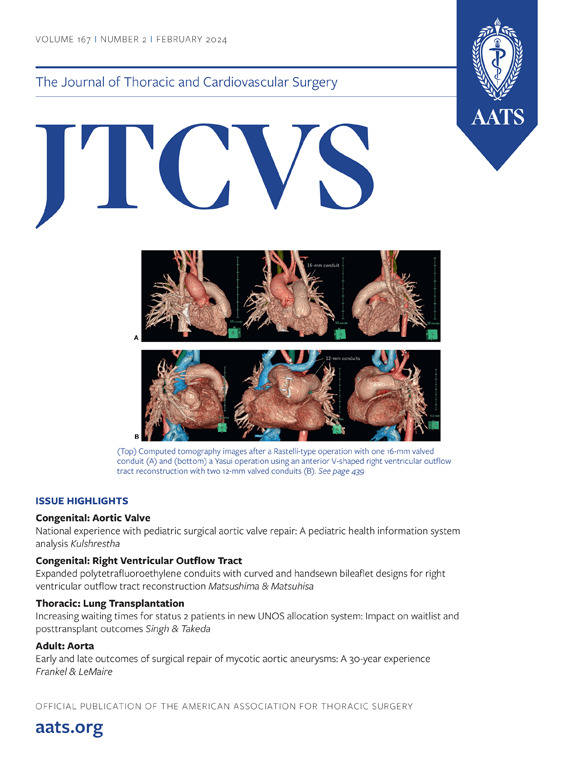Partial heart transplant valves demonstrate growth in piglets despite prolonged cold storage
IF 4.4
1区 医学
Q1 CARDIAC & CARDIOVASCULAR SYSTEMS
Journal of Thoracic and Cardiovascular Surgery
Pub Date : 2025-10-01
DOI:10.1016/j.jtcvs.2025.03.018
引用次数: 0
Abstract
Background
Traditional heart valve replacement options lack growth potential, limiting their long-term effectiveness in pediatric patients. Partial heart transplantation is an emerging approach that offers growth-capable valves by transplanting only the valve-containing segment of the heart. We report on the effects of extended cold storage on the viability and growth potential of partial heart transplantation grafts.
Methods
Pulmonary and aortic conduits were harvested from piglets and human donors and stored at 4°C in cold-storage solution, with some samples supplemented with apoptosis inhibitors, membrane stabilizers, and antibiotics to optimize cellular viability. Viability was assessed in vitro over 7 days using the MTS assay. A piglet model of pulmonary valve replacement was used to assess in vivo growth potential after 1 week of cold storage.
Results
In vitro analysis showed a gradual decline in metabolic activity over 7 days, with approximately 50% viability retained in both porcine and human valves. Supplementation with apoptosis inhibitors and membrane stabilizers did not significantly enhance viability. In vivo, transplanted conduits demonstrated robust leaflet and annular growth without significant stenosis or regurgitation, confirming the maintenance of growth potential despite reduced viability.
Conclusions
Partial heart transplantation grafts can be preserved in cold storage for up to 1 week without significantly compromising in vivo growth potential. These findings support the feasibility of partial heart transplantation as a viable growth-capable valve replacement option for children and suggest that optimized cold storage protocols could facilitate broader access to this technique.
尽管长时间冷藏,仔猪的部分心脏移植瓣膜仍能生长。
背景:传统的心脏瓣膜替代方案缺乏增长潜力,限制了其在儿科患者中的长期有效性。部分心脏移植(PHT)是一种新兴的方法,通过移植心脏中含有瓣膜的部分来提供具有生长能力的瓣膜。在这里,我们报告了延长冷藏对PHT移植物生存能力和生长潜力的影响。方法:取仔猪和人供体的肺导管和主动脉导管,在4°C冷藏液中保存,部分样品添加凋亡抑制剂、膜稳定剂和抗生素以优化细胞活力。使用MTS法评估体外7天的生存能力。采用猪肺瓣膜置换术模型,观察低温保存一周后仔猪的体内生长潜力。结果:体外分析显示,代谢活性在7天内逐渐下降,在猪和人的瓣膜中都保留了大约50%的活力。补充细胞凋亡抑制剂和膜稳定剂不能显著提高细胞活力。在体内,移植的导管显示出强大的小叶和环状生长,没有明显的狭窄或反流,证实了尽管生存能力降低,但仍维持了生长潜力。结论:PHT移植物可以在冷库中保存长达一周,而不会显著影响体内生长潜力。这些发现支持PHT作为一种可行的儿童生长瓣膜置换选择的可行性,并建议优化的冷藏方案可以促进这项技术的广泛应用。
本文章由计算机程序翻译,如有差异,请以英文原文为准。
求助全文
约1分钟内获得全文
求助全文
来源期刊
CiteScore
11.20
自引率
10.00%
发文量
1079
审稿时长
68 days
期刊介绍:
The Journal of Thoracic and Cardiovascular Surgery presents original, peer-reviewed articles on diseases of the heart, great vessels, lungs and thorax with emphasis on surgical interventions. An official publication of The American Association for Thoracic Surgery and The Western Thoracic Surgical Association, the Journal focuses on techniques and developments in acquired cardiac surgery, congenital cardiac repair, thoracic procedures, heart and lung transplantation, mechanical circulatory support and other procedures.

 求助内容:
求助内容: 应助结果提醒方式:
应助结果提醒方式:


